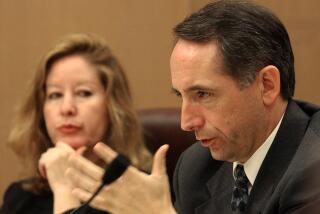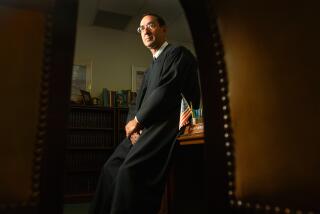Justices Reject Bar’s Advice to Suspend Lawyer
- Share via
SAN FRANCISCO — A sharply divided California Supreme Court on Monday refused to suspend a Beverly Hills lawyer whose role in an illegal tax shelter scheme was labeled by dissenting justices as the work of a “shyster.”
The court held that the 30-day suspension from practice that was recommended by the State Bar would be “overly punitive” under the circumstances. It ruled instead, by a vote of 5 to 2, that attorney Richard I. Chira be placed on three years’ probation.
The unusual action by the court, which ordinarily follows Bar recommendations in disciplinary cases, evoked strong objections from two justices.
“(The attorney’s) transgressions, his participation in a clearly illegal scheme to shelter income, is egregious in the extreme,” Justice Cruz Reynoso said in a dissenting opinion joined by Chief Justice Rose Elizabeth Bird.
‘Contrary to Public Policy’
“It is contrary to public policy (as would be the acts of a common burglar) and damaging to the confidence the public must have in the legal profession (the quintessence of a ‘shyster’).”
Reynoso, Bird and Justice Joseph R. Grodin were defeated by the voters in the general election and will leave the court on Jan. 5.
Chira’s attorney, Mark E. Overland of Los Angeles, defended the court’s action, saying that the case had been “very devastating” to Chira, who he said had not been able to practice law for some time. The dissent, Overland said, “shows a total lack of understanding of the facts of this case.”
Chira, 53, admitted to practice in California in 1975, was convicted in 1981 in federal court of conspiracy to impede the lawful function of the Internal Revenue Service and was sentenced to one year of probation.
According to court records, Chira and another defendant in the case, businessman Garrison Everett, met several times with an undercover IRS agent, who was posing as a wealthy resident alien who wanted to shelter income from 1980 and 1981.
Everett and the undercover agent agreed on a plan to generate an $83,000 tax write-off, in part through the sale and lease-back of a Rolls-Royce automobile owned by Chira. Later, Chira signed a contract for the car that was backdated several months, the records said.
Chira and Everett were subsequently arrested and convicted, with Everett receiving a 10-year prison sentence.
Chira never admitted guilt, saying he had been duped and that the whole episode had been caused by his naivete. Nonetheless, his conviction was upheld by the U.S. 9th Circuit Court of Appeals.
In professional disciplinary proceedings that followed, a State Bar hearing panel found that Chira should be placed on three years’ probation. But later the disciplinary review department of the Bar held that his conduct involved “moral turpitude” and recommended that the justices impose the stiffer penalty of 30 days’ suspension from practice, along with the probation.
Monday’s opinion, signed only “by the court,” said that the attorney had “strained credulity” by contending he did not really comprehend what was going on when he signed a backdated document as part of a tax-shelter scheme.
“It would not take a tax expert to recognize that something was amiss,” the court said. “Such conduct evinces deceit and therefore involves moral turpitude.”
But the court noted that Chira, himself, did not stand to gain any tax benefits and was “clearly a follower” and “overly trusting” of Everett. This was the “only blemish” on his career, it said, concluding that suspension would be “overly punitive” and that probation would be adequate to protect the public.
Reynoso’s dissent said that the scheme involving the attorney would have taken “resources” from the taxpayers “as surely as a mugger--yet the mugger or burglar goes to prison for years.”
Chira’s “embarrassment” over the affair should not mitigate the seriousness of the offense, Reynoso said. “White-collar crime, in my view, is no more mitigated by ‘embarrassment’ than would be the ‘street crime’ of a burglar or mugger.”
More to Read
Get the L.A. Times Politics newsletter
Deeply reported insights into legislation, politics and policy from Sacramento, Washington and beyond. In your inbox twice per week.
You may occasionally receive promotional content from the Los Angeles Times.










